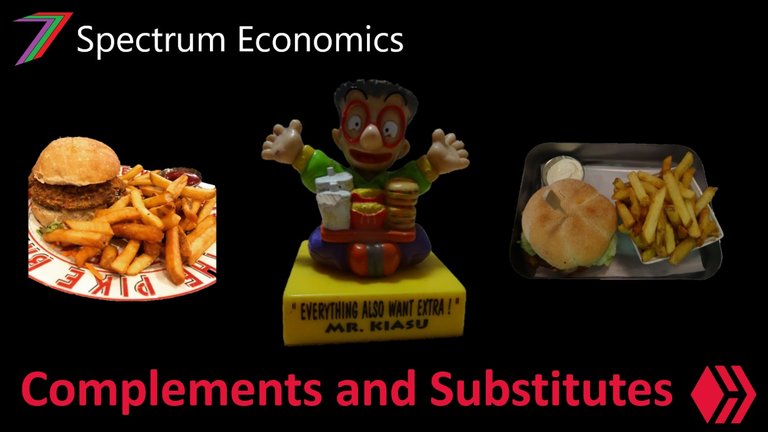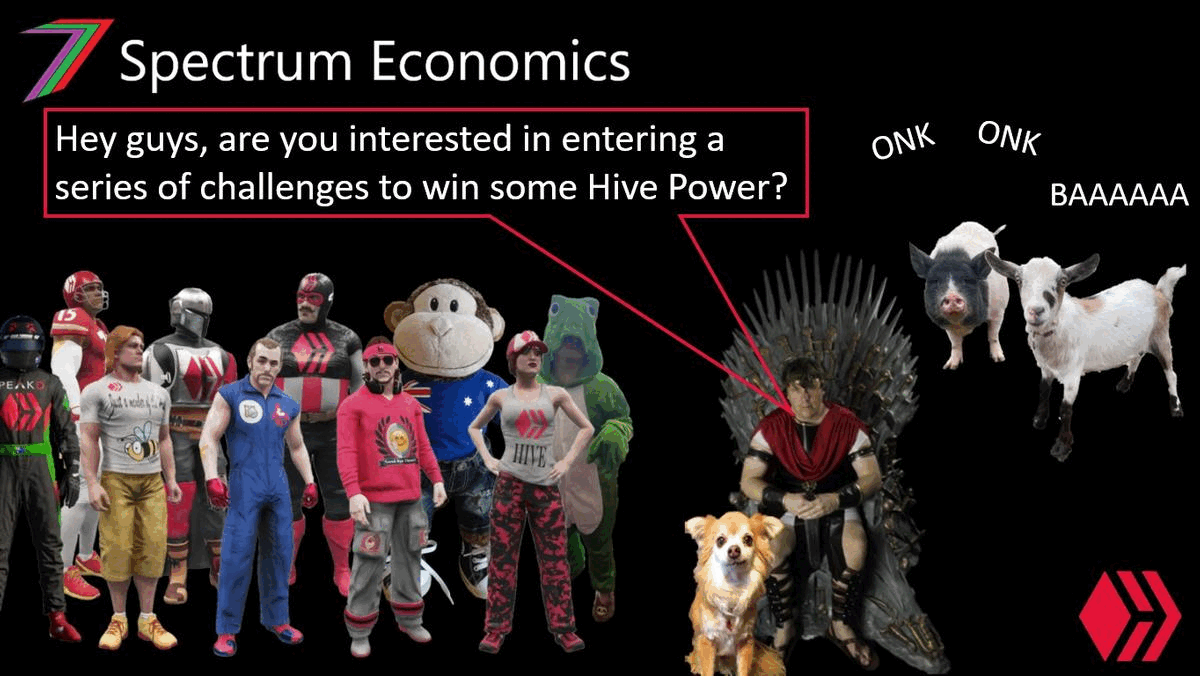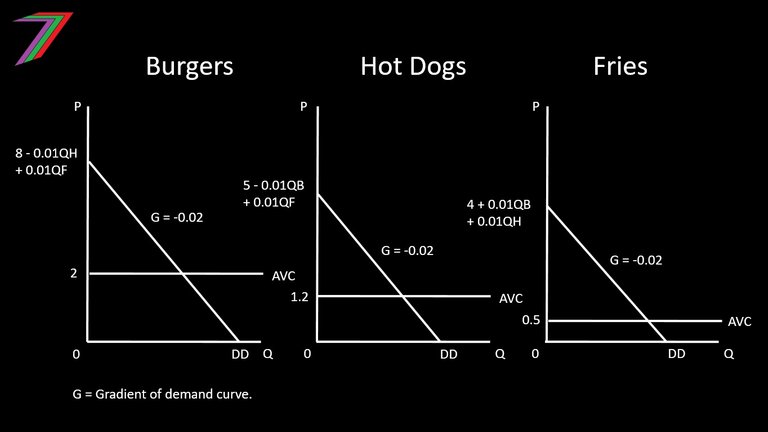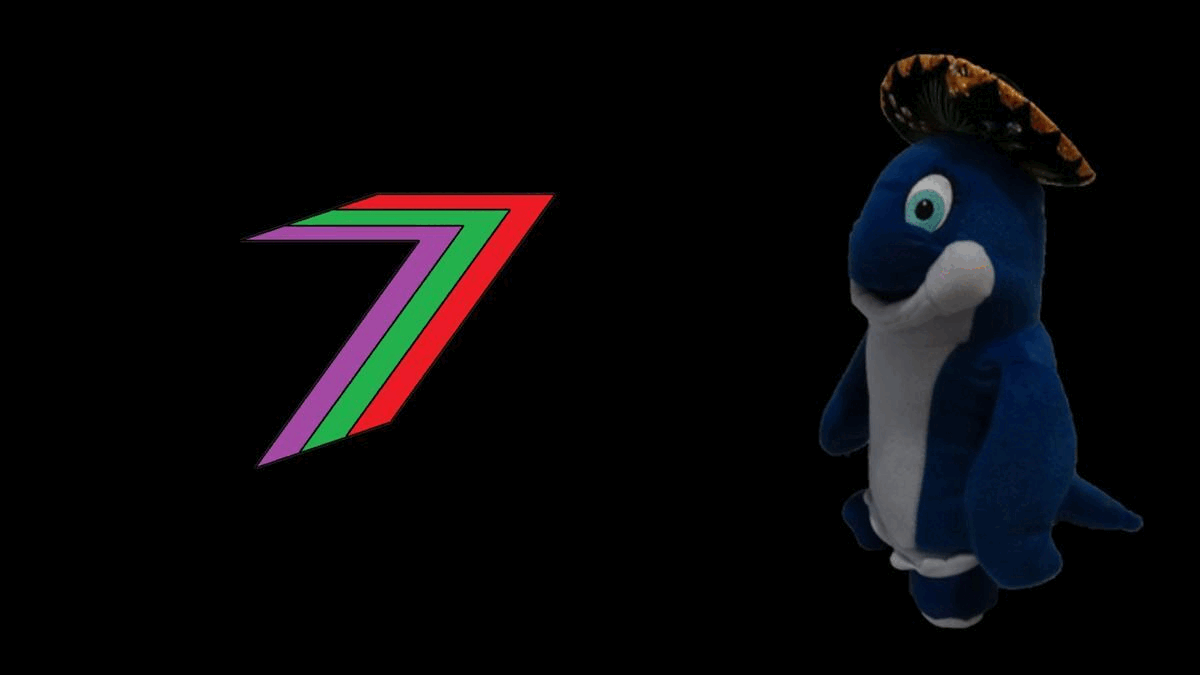Economics Challenge Series – Challenge 3: Complements and Substitutes
Hi Everyone,

Welcome to the Economics Challenge Series for 2023. For the months of July and August, I am running an economics challenge series. The series consists of seven challenges. All seven challenges will commence in July and the results will be published and announced in August. Four of the seven challenges are returning from last year’s Challenge Series. Two are from the monthly contest series and one challenge is completely new. Below are the list of challenges.
- Challenge 1: Buying and Selling Game
- Challenge 2: Pick-a-Door
- Challenge 3: Complements and Substitutes
- Challenge 4: Buying and Selling Game (Business Version)
- Challenge 5: Ice Cream Game
- Challenge 6: Game Theory Game
- Challenge 7: Even-to-Win
Each challenge could reward winners with as much as 60 Hive Power. The value of the prize will depend on the level of participation. For each new participant, the prize will increase by 5 Hive Power. This will continue until 60 Hive Power is reached (12 participants). The first 12 participants will also receive a 50% upvote from this account. In addition to the prize money, the top few participants will be given points. These points will be used to determine the overall challenge series winner. This winner may receive as much as 80 Hive Power. The value of the prize will equal the sum of the number of participants across all challenges. This will continue until 80 Hive Power is reached.

For more information on the challenge series and the upcoming challenges, I recommend that you read my post Economics Challenge Series 2023 (Coming Soon).
Welcome to Challenge 3: Complements and Substitutes
How to Play?
In this challenge, participants are required to price three food items sold at the same store. For this challenge, the three food items are burgers, hot dogs, and fries. Burger and hot dogs are assumed to be substitutes for each other and fries are assumed to be complementary to both burgers and hot dogs. If the food items are substitutes, they are in competition with each other. If a person buys a hot dog they are assumed less likely to buy a burger. If food items are complementary, buying one encourages the buying of the other. We assume fries are treated as a side to accompany a burger or hot dog. However, many people may still wish to buy just one item on its own. Therefore, they are not perfectly complementary.
The participants are required to set the prices of burgers, hot dogs, and fries. The aim is maximise total profits. Participants are provided with variable costs and inverse demand functions for the food items. There are no fixed costs and participants are not required to work with a budget. For this question, no information is required to be generated by any model.
This is a more technical challenge. Participants should be familiar with economic concepts such as demand, supply, complements, and substitutes. The following theoretical posts could be useful.
Economic Concepts #3 - Substitutes vs. Complements
Economic Concepts #5 - Demand, Supply and Equilibrium
Economic Concepts #9 – Price elasticity of demand
The winner is the participant with the highest profit. If two participants obtain the same profit, the participant who entered first wins.
All entries must be made in the comments section of this post.
Each account is only permitted one entry.
Objectives of the game
The objective of the game is to make the highest profit from the sale of burgers, hot dogs, and fries. If two or more participants make the exact same profit, the participant that entered first wins.
Game Information and Assumptions
- Demand is determined by the inverse demand functions provided in the question.
- Supply is assumed to always meet demand (e.g. no shortages if demand is high and no excess or wasted food if demand is low).
- Variable costs per food item is provided.
- Variable cost per a food item does not change as quantity increases or decreases. (e.g. the cost of the first burger is the same as the tenth burger). Therefore, average variable costs are constant.
- There are no fixed costs.
- Based on the above assumptions regarding costs, we can also assume average variable costs equate to average costs.
- Participants are not constrained by a budget.
How are the results of the game determined?
The quantities sold are determined mathematically based on the inverse demand functions provided. Profits are determined by subtracting total cost from total revenue. Total cost is calculated by multiplying quantity by variable costs per item (i.e. average variable costs). Total revenue is calculated by multiplying quantity by price. No values need to be generated by a model. Participants can calculate their profit using the information in the question.
Contest Prizes
The total prize for this challenge could reach as high as 60 Hive Power. The number of participants determines the value of the prize. For every entry, the prize is increased by 5 Hive Power until a value of 60 Hive Power is reached. The winner will receive 2/3 of the prize and second place will receive 1/3. The first 12 entries will be given upvotes. The winner of this challenge will be given 40 points and second place 20 points. These points will be tallied at the end of the challenge series to determine the overall winner.
Let the challenge begin
Participants are running a food stall that sells burgers, hot dogs, and fries. They are required to price all three food items. Below are the inverse demand functions (i.e. price expressed as a function of quantity) and the average variable costs for all three food items.
Inverse Demand Functions
PB = 8 – 0.02QB – 0.01QH + 0.01QF
PH = 5 – 0.02QH – 0.01QB + 0.01QF
PF = 4 – 0.02QF + 0.01QB + 0.01QH
Variable Costs
AVCB = 2
AVCH = 1.2
AVCF = 0.5
Legend:
PB – Price of burgers
PH – Price of hot dogs
PF – Price of fries
QB – Quantity of burgers
QH – Quantity of hot dogs
QF – Quantity of fries
AVCB - Average Variable Cost Burgers
AVCH - Average Variable Cost Hot Dogs
AVCF - Average Variable Cost Fries
The above equations can also be represented graphically. See graph below.

Entry format
For this challenge, I expect to see entries made in the following format:
Prices:
Burgers: $X
Hot Dogs: $Y
Fries: $Z
Example of entry
Prices:
Burgers: $3.50
Hot Dogs: $2.10
Fries: $1.25
The closing date and time for this challenge is 6PM coordinated universal time (UTC) 20/07/2023. Responses after this time will not be accepted. The winners will be announced in the results post.
I hope everyone has fun and enjoys the third challenge. I look forward to your participation in the remaining challenges. If you have any questions, feel free to ask in the comments section.
More posts

I have several collection of posts. I have organised these collections based on content and purpose.
The first collection contains six collection posts created before PeakD had the collection feature. Four of these posts relate to the core of my content, one of them contains all my Actifit Posts, and one of the them contains my video course ‘Economics is Everyone’.

The second collection consists of the posts that I consider define my channel. These posts are significant in terms of content as well as how they contribute to the growth of the channel. These posts reveal the most about what I believe in.

The third and fourth collection is what I call my ‘Freedom-base Economics living book’. They contain all the posts that support my ideas about the value and power of freedom. Some of these posts explain what we can achieve with freedom and what we need to utilise it. Some of them explain how we are deprived of freedom and how we often give up freedom for security and comfort. The third collection concludes with possible scenarios depending on what we (society) choose to do.


Hive: Future of Social Media

Spectrumecons on the Hive blockchain

Prices:
Burgers: $3.90
Hot Dogs: $2.40
Fries: $1.10
Prices:
Burgers: $3.55
Hot Dogs: $2.38
Fries: $1.25
Prices:
Burgers: $3.50
Hot Dogs: $2.50
Fries: $1.30
Prices:
Burgers: $3.70
Hot Dogs: $2.45
Fries: $1.15
Prices:
Burgers: $3.90
Hot Dogs: $2.45
Fries: $1.30
Prices:
Burgers: $2.75
Hot Dogs: $1.95
Fries: $1.25
Prices:
Burgers: $4.4
Hot Dogs: $2.1
Fries: $1.8
Prices:
Burgers: $5.10
Hot Dogs: $3.25
Fries: $2.00
Prices:
Burgers : $3.10
Hot Dogs : $1.70
Fries : $1.30
Prices
Burgers; $3.45
Hot dogs; $1.75
Fries; $1.20
Prices:
Burgers: $2.79
Hot Dogs: $1.89
Fries: $0.99
Prices Prices:
Burgers: $3.40
Hot Dogs: $2.25
Fries: $1.35
Prices:
Burgers: $2.80
Hot Dogs: $1.85
Fries: $1.10
Prices
Burgers: $3.25
Hot Dogs: $2.25
Fries: $1.25
Prices:
Burgers: $3.29
Hot Dogs: $1.81
Fries: $1.64
Prices:
Burgers: $5.10
Hot Dogs: $3.25
Fries: $2.10
Prices:
Burgers: $5.20
Hot Dogs: $3.25
Fries: $2.00
Prices:
Burgers: $5.20
Hot Dogs: $3.25
Fries: $2.10
Prices:
Burgers: $5.10
Hot Dogs: $3.30
Fries: $2.00
Prices:
Burgers: $5.10
Hot Dogs: $3.30
Fries: $2.10
Prices:
Burgers: $5.00
Hot Dogs: $3.20
Fries: $2.20